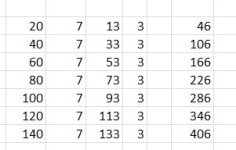Ok, I checked PG who sell a 1MB memory card for £400.
https://www.parmley-graham.co.uk/au.../s7-400/feprom-memory-card/6es7952-1kk00-0aa0
Let's assume they have the least inventory because of brexit.
So one solution is:
Vendor 1 sold all their memory cards for £8000.
Vendor 2 sold all their memory cards for £8000.
Vendor 3 sold all their memory cards for £8000.
Vendor 4 sold all their memory cards for £8000.
Vendor 5 sold all their memory cards for £8000.
Vendor 6 sold all their memory cards for £8000.
Vendor 7 sold all their memory cards for £8000.
However, we recognise that this means that vendor 7 sold their units at 8000/140 = 54.1428571, which is weird.
If we assume now that:
The same lowest price (in pence) must be divisible by 20, 40, 60, 80, 100, 120, 140.
PGs online prices are not what their customers pay
So.. 8400 is the lowest common multiple of the stock quantities, so the total earnings for each company must be a multiple of £84.00
So one solution is:
Vendor 1 sold all their memory cards for £84.00.
Vendor 2 sold all their memory cards for £84.00.
Vendor 3 sold all their memory cards for £84.00.
Vendor 4 sold all their memory cards for £84.00.
Vendor 5 sold all their memory cards for £84.00.
Vendor 6 sold all their memory cards for £84.00.
Vendor 7 sold all their memory cards for £84.00.





